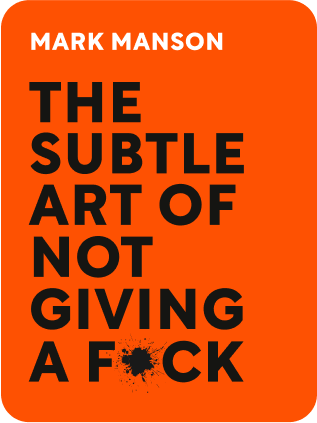

This article is an excerpt from the Shortform book guide to "The Subtle Art of Not Giving a F*ck" by Mark Manson. Shortform has the world's best summaries and analyses of books you should be reading.
Like this article? Sign up for a free trial here .
Want to stop giving so many f*cks? How can these The Subtle Art of Not Giving a F*ck book exercises help you evaluate your priorities?
Mark Manson’s book The Subtle Art of Not Giving a F*ck advises readers to prioritize what they care about, because it’s impossible to care equally about everything. This article provides exercises to help you evaluate whether you’re giving a f*ck about the right things.
Continue below for The Subtle Art of Not Giving a F*ck book exercises.
The Subtle Art of Not Giving a F*ck Exercises
The Subtle Art of Not Giving a F*ck by Mark Manson argues that we are frustrated in life and feel like failures because we value and prioritize the wrong things, thanks in part to society’s emphasis on positive thinking, over-involved parents, and our susceptibility to superficial social media messages. This leads us to pursue emotional highs that don’t lead to lasting happiness. The solutions are counterintuitive and include: be wrong, fail, tolerate feeling bad, accept pain, practice rejection. Because we can’t care equally about everything, we need to prioritize and focus on what brings us happiness and meaning.
The exercises below are inspired by Mark Manson’s book:
Giving Less of a F*ck about Small Things
You probably spend too much time pursuing and caring (giving a f*ck) about superficial things. This uses up energy that could be devoted to things you value more.
- Think of a time recently when something small got under your skin and you obsessed about it. What was it?
- How did you react? Did it have positive or negative results?
- How do you feel about it now? Did worrying about it ultimately matter in the long run?
Listening to Your Emotions
The purpose of emotions is to give us feedback, telling us that something is good or bad for us.
- Think of a recent situation that aroused a strong emotion. What happened? What emotion did you feel?
- If you think of emotions as having the purpose of communicating something, what was your emotion saying? If negative, did it suggest an action to take in the future? If positive, did it suggest something good you should keep doing?
No Pain, No Gain
Don’t aim for a pain-free life. When you strive for something that is important to you, you accept the pain necessary to get there.
- What’s a goal that is very important to you?
- How much pain are you willing to endure to achieve your goal? What amount of pain would cause you to abandon the goal?
Do You Feel Entitled?
A feeling of entitlement can stand in the way of improving yourself and succeeding in your work and relationships.
- Have you ever thought in an entitled way? (This might mean you feel your problems are unique; that the rules don’t apply to you; that you deserve special treatment; that you consider yourself a victim.)
- After reading this chapter, what is a more emotionally healthy way to think of yourself?
- Do you currently feel inadequate in any area of your life? What is it? Who are you comparing yourself to?
- Consider the possibility that you might just be average in that area — how does that make you feel? Do you feel less pressure to achieve a particular expectation?
Be Self-Aware About Your Values
Question how you feel and why to uncover your deepest values.
- Think of something that’s currently bothering you. What is it? What emotion are you feeling?
- Why does that bother you?
- Why does that bother you? Keep answering this question a few times until you can’t anymore. Type each question and response here.
- At the end of your questioning, you should arrive at a value that you care about. Now go back to the original situation in the first question. Understanding your value, do you see the situation in a new light? Should you reframe your value? Should you use a different yardstick to interpret the situation?
Taking Responsibility
Things may happen to us that aren’t our fault. But we are still responsible for how we choose to respond to them.
- Think of something that happened to you that wasn’t your fault but that you feel resentful about. What was it?
- Remember that no matter the circumstance, you always have the ability to make choices and the responsibility to decide how you feel. Given this, how should you change how you feel, or how you behave?
Embrace Being Wrong
Much of what we think we know is wrong. Being willing to learn and change our beliefs is how we grow.
- Think of a disagreement you had recently when you thought you were right and everyone else was wrong and dumb. What was the situation?
- Now force yourself to ask — “what if I’m wrong?” What evidence would convince you that the other person was right?
- If you were wrong, what does that mean about you on a deeper level? What weakness might this reveal about you?
Success from Failure
Improving at anything requires failing many times and building on those failures.
- Think of a goal that’s important for you, but that you’re not making as much progress on as you’d like. What is it?
- Is it possible that you’re afraid of failing? In what ways could this be holding you back?
- Remember that failure is necessary to improve. It’s better to try and learn, than to not try at all. Given this, what is one small action you can take today to just do it?
Giving a F*ck About the Important Things
A fulfilling life requires making choices — accepting the important things, and rejecting others.
- What is one important thing in life that you want to commit to?
- What does pursuing this require you to reject? This might be other options that are incompatible with your goal, or alternatives to spending your time.
- Are you willing to reject what you listed above, in pursuit of your goal?
Giving a F*ck — Or Not
The key to a happy, meaningful life is to give a f*ck about less, and focus only on what is most valuable and important to us.
- Make a list of things you give a f*ck about.
- Make a list of things you don’t give a f*ck about, that society suggests you should give a f*ck about.
- In your first list, are there any things that, at the end of the day, don’t seem that important?

———End of Preview———
Like what you just read? Read the rest of the world's best book summary and analysis of Mark Manson's "The Subtle Art of Not Giving a F*ck" at Shortform .
Here's what you'll find in our full The Subtle Art of Not Giving a F*ck summary :
- How to clarify what's important to you (and not just what you think should be important)
- Why it's okay for things to not always go well in life
- Why you need to care about fewer things






